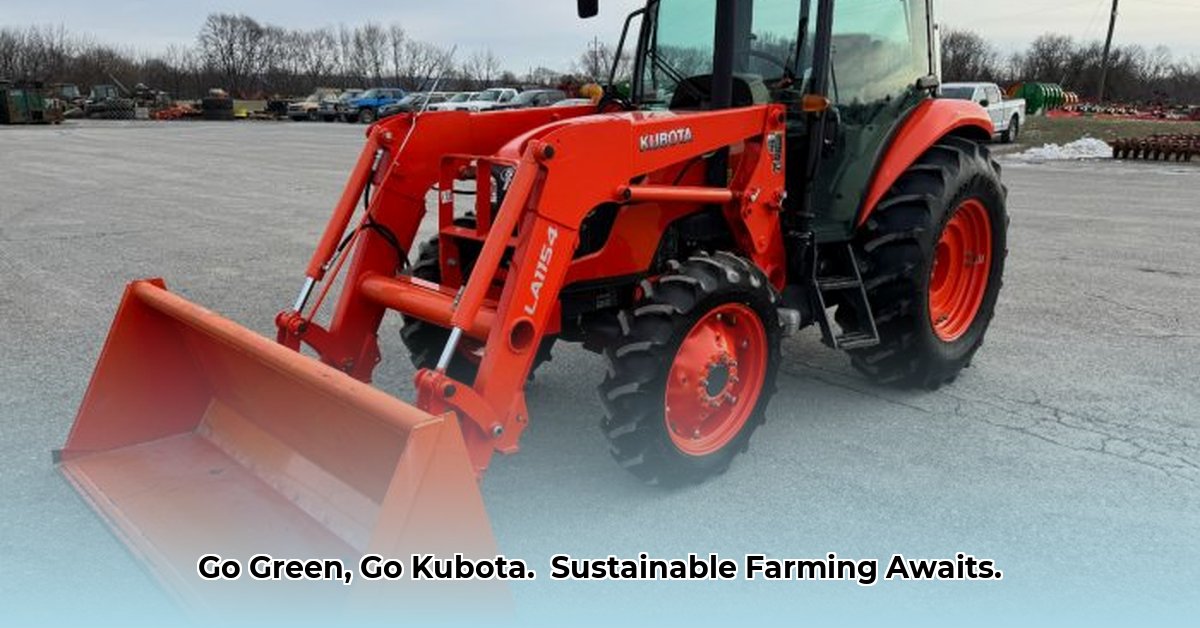
4x4 Kubota Tractor: Your Key to Sustainable Farming
The Kubota 4x4 tractor offers a powerful approach to sustainable agriculture, promising increased efficiency and reduced environmental impact. This isn't simply about larger yields; it's about smarter, more environmentally conscious farming practices. How can a tractor contribute to a greener future? Let's explore the key benefits. For more info on Kubota subcompact tractors, see this page.
Maneuverability and Precision: Farming with Finesse
The Kubota 4x4’s all-wheel drive provides exceptional traction, minimizing wheel slippage, even in challenging conditions. This translates to more precise planting, leading to improved seed distribution and reduced wasted resources. Think of it as the difference between using a shovel and a laser cutter—the precision is unmatched. This improved accuracy directly impacts your bottom line and environmental footprint. Isn't precise planting essential for maximizing yield and minimizing resource waste?
"The superior grip of the 4x4 system allows for incredibly precise planting, minimizing overlaps and reducing the need for extra seed," notes Dr. Emily Carter, Agricultural Engineer at the University of California, Davis.
Fuel Efficiency: Saving Money and the Planet
Fuel costs are a major expense for farmers. The Kubota 4x4's efficient engine and smart engineering significantly reduce fuel consumption without compromising power. Lower fuel costs directly translate into savings, while also reducing your farm's carbon footprint––a win-win situation. How much can you save with improved fuel efficiency? While precise figures depend on usage, many farmers report considerable savings compared to older models or less efficient machinery.
Versatile Attachments: A Tractor for All Seasons
Sustainable farming demands maximizing resource utilization. The Kubota 4x4’s compatibility with a wide range of attachments transforms it into a versatile workhorse. From tilling and spraying to hauling, this tractor streamlines operations, reducing the need for multiple specialized machines and saving on purchasing and maintenance costs.
Here's how specific attachments enhance sustainable practices:
- Precise Fertilizer Application: Minimizes fertilizer waste and reduces the risk of water pollution, leading to healthier crops and a healthier environment.
- Targeted Pesticide Spraying: Reduces pesticide usage, protecting beneficial insects and decreasing the overall environmental impact. Less pesticide means a healthier ecosystem and lower expenses.
- Improved Soil Health: Proper tillage enhances soil structure, minimizing erosion and maximizing water retention. Healthy soil leads to healthier plants and reduced chemical reliance.
Weighing the Pros and Cons: A Realistic Assessment
While the benefits are substantial, it's crucial to consider both sides:
| Feature | Pros | Cons |
|---|---|---|
| All-Wheel Drive | Superior traction; less fuel wasted; increased productivity. | Higher initial purchase price. |
| Fuel Efficiency | Lower operating costs; reduced environmental impact. | Fuel efficiency may vary depending on terrain and operational demands. |
| Versatility | Wide range of attachments; increased usefulness. | Additional investment in attachments required. |
| Maintenance | Regular maintenance ensures longevity. | Specialized knowledge or professional servicing may be needed. |
How to Choose the Right Smart Tractor for Sustainable Small Farm Operations
Smart tractors are revolutionizing agriculture, offering sustainable solutions for small-scale farming. This section provides a step-by-step guide to help you make an informed decision.
Understanding Your Needs: Size and Capability
Begin by assessing your farm's size, layout, terrain, and operational needs. Smaller farms require compact, maneuverable tractors, while larger operations might need more powerful machines. Do you primarily cultivate crops, manage livestock, or engage in mixed farming? This will determine the features you'll need.
Power and Efficiency: Finding the Optimal Balance
Fuel efficiency is paramount. Look for tractors with advanced engine technology and efficient powertrains. Features such as automatic engine shutdown during idle periods significantly reduce fuel consumption. Determine the appropriate horsepower based on your typical tasks; avoid over- or under-powering your machine.
Precision Agriculture: Farming Smarter, Not Harder
Smart tractors excel in precision agriculture. GPS-guided steering, automated planters, and variable-rate technology (for fertilizer and pesticide application) maximize yield and minimize waste. These features reduce input costs, improve resource use, and lessen your farm's environmental footprint.
Smart Tractor Features: Technology's Key Assets
- GPS-guided steering: Ensures straight, efficient passes.
- Automated planter/sprayer: Optimizes seed/chemical distribution.
- Variable-rate technology: Tailors input to specific field conditions.
- Data logging and analysis: Provides valuable insights for improvement.
- Remote monitoring: Enables tracking of tractor activity remotely.
Making the Right Choice: A Practical Guide
- Assess your farm's needs: Size, terrain, operations.
- Determine your budget: Consider initial costs and ongoing maintenance.
- Research different models: Compare features, efficiency, and reliability.
- Seek advice from other farmers: Get firsthand accounts and recommendations.
- Test drive: Ensure the tractor fits your needs and comfort levels.
- Explore financing options: Leases, loans, or government subsidies.
Choosing a smart tractor is an investment in your farm's future––an investment in both sustainability and profitability. The Kubota 4x4, with its combination of power, precision, and versatility, is worth considering as you plan for the future of your farming operation.